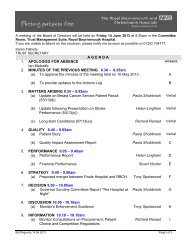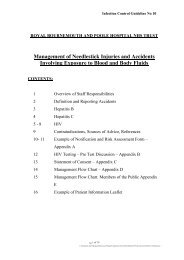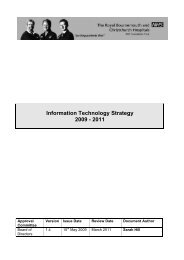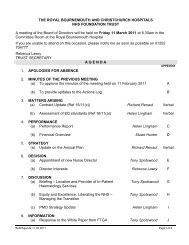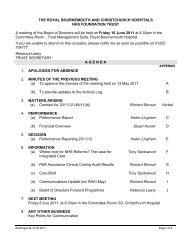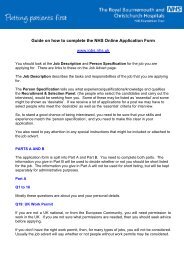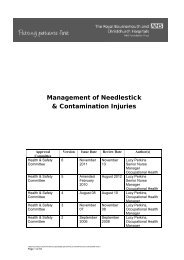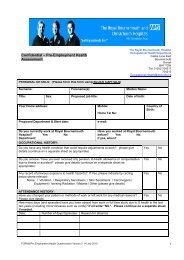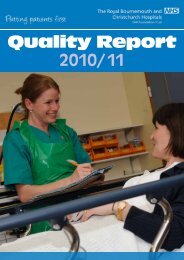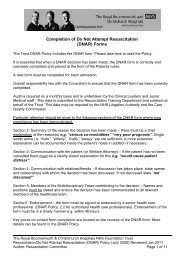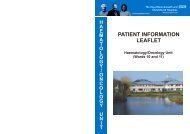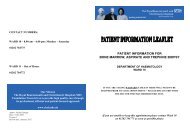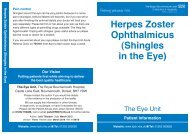Annual Report and Accounts 2012/13 - Royal Bournemouth Hospital
Annual Report and Accounts 2012/13 - Royal Bournemouth Hospital
Annual Report and Accounts 2012/13 - Royal Bournemouth Hospital
- No tags were found...
You also want an ePaper? Increase the reach of your titles
YUMPU automatically turns print PDFs into web optimized ePapers that Google loves.
Financial <strong>Accounts</strong>1.11 ProvisionsThe Foundation Trust recognises aprovision where it has a present legal orconstructive obligation of uncertain timingor amount; for which it is probable thatthere will be a future outflow of cash orother resources; <strong>and</strong> a reliable estimatecan be made of the amount. The amountrecognised in the Statement of FinancialPosition is the best estimate of theresources required to settle the obligation.Where the effect of the time value ofmoney is significant, the estimated riskadjustedcash flows are discounted usingthe discount rates published by HMTreasury.Clinical negligence costsThe NHS Litigation Authority (NHSLA)operates a risk pooling scheme underwhich the Foundation Trust pays anannual contribution to the NHSLA,which, in return, settles all clinicalnegligence claims. Although the NHSLAis administratively responsible for allclinical negligence cases, the legal liabilityremains with the Foundation Trust.The total value of clinical negligenceprovisions carried by the NHSLAon behalf of the Foundation Trust isdisclosed at note 24 but is not recognisedin the Foundation Trust’s accounts.Non-clinical risk poolingThe Foundation Trust participates inthe Property Expenses Scheme <strong>and</strong>the Liabilities to Third Parties Scheme.Both are risk pooling schemes underwhich the Foundation Trust paysan annual contribution to the NHSLitigation Authority <strong>and</strong> in returnreceives assistance with the costs ofclaims arising. The annual membershipcontributions, <strong>and</strong> any ‘excesses’ payablein respect of particular claims, arecharged to operating expenses when theliability arises.1.12 ContingenciesContingent assets (that is assets, arisingfrom past events whose existence willonly be confirmed by one or more futureevents not wholly within the FoundationTrust’s control) are not recognisedas assets, but are disclosed by notewhere an inflow of economic benefits isprobable.Contingent liabilities are not recognised,but are disclosed by note unless theprobability of a transfer of economicbenefits is remote. Contingent liabilitiesare defined as:l possible obligations arising frompast events whose existence will beconfirmed only by the occurrence ofone or more uncertain future eventsnot wholly within the FoundationTrust’s control; orl present obligations arising from pastevents but for which it is not probablethat a transfer of economic benefitswill arise or for which the amount ofthe obligation cannot be measuredwith sufficient reliability.1.<strong>13</strong> Public Dividend Capital(PDC) <strong>and</strong> PDC DividendPublic dividend capital (PDC) is a type ofpublic sector equity finance based on theexcess of assets over liabilities at the timeof establishment of the predecessor NHSTrust. HM Treasury has determined thatPDC is not a financial instrument withinthe meaning of IAS 32.A charge, reflecting the cost of capitalutilised by the Foundation Trust, ispayable as public dividend capitaldividend. The charge is calculated atthe rate set by HM Treasury (currently3.5%) on the average relevant netassets of the Foundation Trust duringthe financial year. Relevant net assetsare calculated as the value of all assetsless the value of all liabilities, exceptfor (i) donated assets (including lotteryfunded assets), (ii) net cash balances heldwith the Government Banking Services(GBS), excluding cash balances held inGBS accounts that relate to short-term30<strong>Annual</strong> <strong>Report</strong> <strong>and</strong> <strong>Accounts</strong> <strong>2012</strong>/<strong>13</strong>



